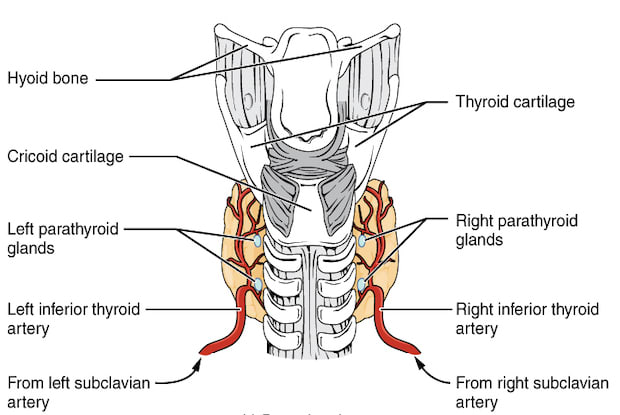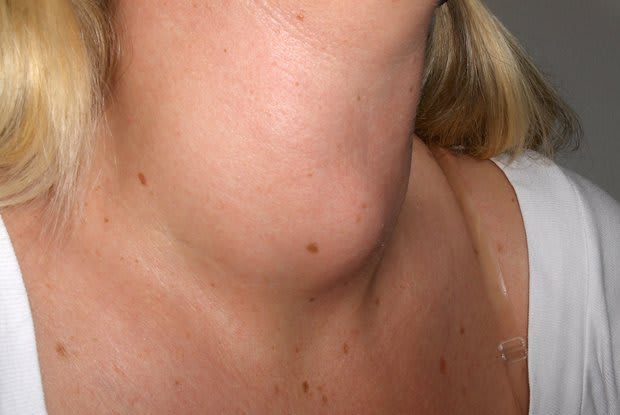Table of Contents
I. What is the thyroid and what does it do?
a. Hormones produced by the thyroid
II. Types of thyroid disorders
III. Treatments and medications
a. Hyperthyroidism & hypothyroidism treatment
c. Goiter and thyroid nodules treatment
What is the thyroid and what does it do?
The thyroid is an important part of the endocrine system. The endocrine system is made up of the pituitary gland, thyroid, parathyroid, adrenal glands, pancreas, ovaries, and testicles. The endocrine system affects almost every organ and cell in the body. The glands in the endocrine system process materials in the blood and secrete the finished chemical product for use in the body. Thyroid malfunctions can lead to many problems in the body, but symptoms can be controlled with medications like Synthroid. [1]
The thyroid is a small gland that is responsible for several important bodily functions. The thyroid gland is located at the front of the neck, below the Adam’s apple or larynx. This gland is butterfly-shaped and has two lobes that are located on either side of the windpipe (trachea).
a. Hormones produced by the thyroid
As part of the endocrine system, the thyroid is responsible for producing hormones that regulate the body’s metabolic rate as well as heart and digestive function, muscle control, brain development, mood and bone maintenance. The proper amount of iodine is needed for proper functioning of this gland.
The thyroid produces the following hormones:
Thyroxine: This is the main hormone secreted by the bloodstream and plays a huge role in digestion, heart and muscle function, brain development and the maintenance of bones.
Triiodothyronine: This thyroid hormone is responsible for regulating the body’s metabolic rate, heart and digestive functions, muscle control, brain development and function, as well as the maintenance of bones.
Calcitonin: This hormone is produced by the C-cells (neuroendocrine cells) of the thyroid gland. In humans, it plays a minor role in calcium balance. [2]

Types of thyroid disorders
There are several different types of disorders that can arise if the gland is not functioning properly. Read below to learn more about some common thyroid disorders.
Hyperthyroidism
When a person suffers from hyperthyroidism, their thyroid gland is overactive. Hyperthyroidism involves the overproduction of thyroid hormones. This disorder affects around 1 percent of women and is much less common in men.
Symptoms of hyperthyroidism include:
- Nervousness
- Racing heart
- Increased sweating
- Anxiety
- Restlessness
Hypothyroidism
This disorder is the opposite of hyperthyroidism, so the thyroid gland is underactive and does not produce enough thyroid hormones. Most cases of hypothyroidism are mild and affect 4.6 percent of people 12 years old and older.
Symptoms of hypothyroidism include:
- Fatigue
- Dry skin
- Memory problems
- Constipation
- Depression
- Weight gain
- Weakness
Hashimoto’s disease
Hashimoto’s disease is one of the most common causes of hypothyroidism. Hashimoto’s disease is also known as chronic lymphocytic thyroiditis and affects around 14 million Americans. Hashimoto’s disease most often occurs in middle-aged women. This disease occurs when the immune system attacks the thyroid gland, which hinders its ability to produce hormones. Symptoms differ from person to person and symptoms are often subtle or undetectable until later in life.
Symptoms of Hashimoto’s disease include:
- Fatigue
- Depression
- Constipation
- Mild weight gain
- Dry skin
- Thinning hair
- Enlarged thyroid
- Heavy or irregular menstruation

Graves’ Disease
This thyroid disorder is the most common cause of hyperthyroidism and is named after the doctor who discovered it 150 years ago. Graves’ disease affects 1 in 200 people in the United States. This is a hereditary disease that is common in women between 20 and 30 years old. Stress, pregnancy, and smoking are common risk factors. Like other thyroid disorders, Graves’ disease involves the immune system attacking the thyroid gland.
Symptoms of Graves’ disease include:
- Anxiety
- Irritability
- Fatigue
- Hand tremors
- Diarrhea
- Excessive sweating
- Difficulty sleeping
- Bulging eyes
- Enlarged thyroid
Goiter
This is a noncancerous enlargement of the thyroid gland, which is most often caused by a deficiency in iodine. Of the 800 million iodine-deficient people in the world, researchers estimate that goiters affect 200 million. Goiters can affect people of all ages, but definitely occur more in parts of the world where iodine-rich foods are harder to come by.
Iodine-rich foods include seaweed, dairy, tuna, shrimp, and eggs. Iodine is an important mineral that the body gets from the food you eat. The recommended daily amount of iodine is 150 mcg for most adults. There might not be any symptoms if the goiter isn’t severe.
Symptoms of goiter may include:
- Swelling or tightness in the neck
- Difficulties breathing or swallowing
- Hoarseness of voice
- Coughing or wheezing

Thyroid nodules
Thyroid nodules are growths that form on the thyroid gland. In iodine-deficient countries, around 1 percent of men and 5 percent of women suffer from thyroid nodules. Around 50 percent of people with this condition have nodules too tiny to feel.
The nodules can be solid or fluid-filled and often harmless. Most people do not experience severe symptoms, but if the nodule grows big enough it can impact breathing and cause pain in the throat. Symptoms of thyroid nodules include:
- High pulse rate
- Nervousness
- Tremors
- Weight loss
- Clammy skin
Thyroid cancer
This cancer is the most common type of endocrine cancer in children. It is diagnosed in 1 out of every million children under the age of 10 each year. This condition becomes more common in teenagers, with a rate of 15 cases per million in 15-19-year-olds. Symptoms of thyroid cancer include:
- Lump in the neck
- Swollen glands
- Hoarse voice
- Trouble breathing or swallowing
- Tight feeling in neck [3]
Treatments and medications
Thyroid disorders can present differently in every person. Your doctor will create your own personal treatment, but the goal of all thyroid treatments is to restore normal blood levels of the thyroid hormone. Thyroid disorders are lifelong conditions, but with careful monitoring and proper treatment, people can live a happy and healthy life.
a. Hyperthyroidism & hypothyroidism treatment
A common medication used to treat hypothyroidism is Synthroid, also known by its generic name levothyroxine. This is a synthetic hormone that replaces missing thyroid hormones in the body.
Hyperthyroidism can be more difficult to treat. Treatment may include drug therapy to block hormone production and radioactive iodine treatment that disables the thyroid. In more severe cases, surgery may be needed to remove all or part of the thyroid. When radioactive iodine therapy is used, hypothyroidism can occur which then requires the use of Synthroid to regulate hormone levels. [4]

b. Graves’ Disease treatment
There is no cure for Graves’ disease, but it can be controlled with a combination of treatments, which can include:
- Beta-blockers to control rapid heart rate, anxiety, and sweating
- Anti-thyroid medications like Propylthiouracil to prevent thyroid from making excess hormone
- Radioactive iodine to destroy all or part of your thyroid
c. Goiter and thyroid nodules treatment
Doctors can diagnose goiters and nodules with a physical examination. Nodules are often not life-threatening and do not require treatment. Your doctor may recommend radioactive iodine treatment if the nodules grow over time. In rare cases, the nodules can become cancerous, which then requires chemotherapy.
Goiters are treated when they become severe enough to cause symptoms. To treat a goiter, you can take small amounts of iodine if the goiter is caused by a deficiency in the vitamin. [3]
The content in this article is intended for informational purposes only. This website does not provide medical advice. In all circumstances, you should always seek the advice of your physician and/or other qualified health professionals(s) for drug, medical condition, or treatment advice. The content provided on this website is not a substitute for professional medical advice, diagnosis or treatment.
